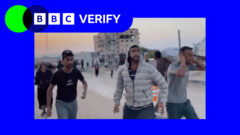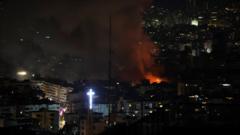Yasser Abu Shabab, a Bedouin militia leader in eastern Rafah, is accused of exploiting humanitarian crises while Israel navigates its strategy against Hamas.
Yasser Abu Shabab: The Controversial Militia Leader in Gaza

Yasser Abu Shabab: The Controversial Militia Leader in Gaza
The rise of Yasser Abu Shabab in Gaza poses complex questions about aid distribution and regional security.
In the politically charged landscape of southern Gaza, one man has emerged as a key player in the ongoing struggle against Hamas: Yasser Abu Shabab. In his 30s, this Bedouin leader current commands the Popular Forces, a Palestinian militia that operates primarily in eastern Rafah, strategically located near a crucial border crossing with Israel.
Israeli officials suggest that Mr. Abu Shabab’s militia has received support from the Israeli government as part of a broader initiative to weaken Hamas's grip on the region. However, despite the claims of Israel, his group has publicly refuted allegations of receiving any weapons. There exists significant criticism from both the Palestinian community and international organizations, particularly concerning accusations that Mr. Abu Shabab's forces have been implicated in the looting of aid deliveries—critical lifelines in an area where hunger has reached alarming levels.
Israel's rationale for collaborating with Abu Shabab’s militia is rooted in a contentious security strategy. Prime Minister Benjamin Netanyahu emphasized the government’s strategy of activating local clans opposed to Hamas, arguing that this engagement is necessary for safeguarding Israeli soldiers' lives. Yet, analysts express skepticism over the effectiveness and consequences of this collaboration, noting that the Popular Forces remain small in comparison to Hamas's extensive network.
As tensions continue to rise and cease-fire talks proceed erratically, the role of Yasser Abu Shabab illustrates the complicated interplay between local dynamics, humanitarian needs, and international politics in the Gaza Strip.





















